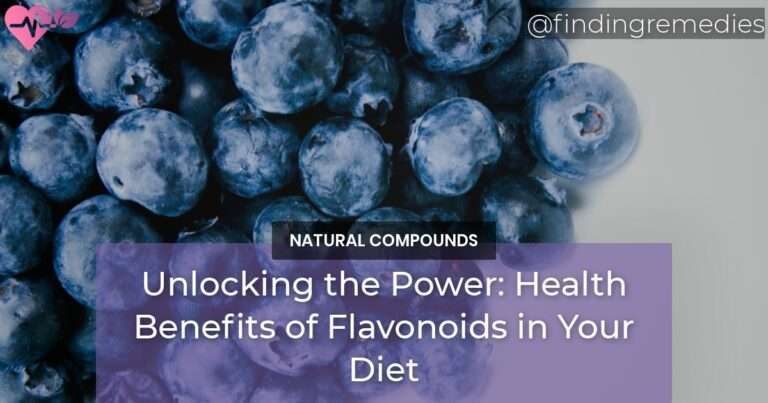Do you want to know how to unlock the power of health benefits from flavonoids found in everyday foods? You may already be getting these benefits without even knowing it. Flavonoids are found in many of the foods we eat and can have powerful effects on our health.
In this article, we’ll explore the health benefits of flavonoids and how they can be used to improve your overall health. We’ll discuss how incorporating flavonoids into your diet can help reduce the risk of certain diseases, boost your immunity, and promote healthy aging. We’ll also look at which foods are high in flavonoids and how to incorporate them into your daily meals. With this knowledge, you’ll be able to make informed decisions to improve your health and well-being. So let’s get started and unlock the power of flavonoids in your diet!
Table of Contents
Introduction to Flavonoids
Flavonoids are a type of polyphenol, a group of naturally occurring antioxidants found in plants. These phytonutrients give fruits and vegetables their vibrant colors and are known for their health-promoting properties.
What are Flavonoids?
Flavonoids are a diverse group of compounds found in plant-based foods. They are classified into six subclasses: flavones, flavonols, flavanones, flavan-3-ols, anthocyanins, and isoflavones.
Types of Flavonoids
The subclass of flavonoids varies in their chemical structure and function. Flavones and flavonols are found in fruits, vegetables, grains, and herbs, while flavanones are found primarily in citrus fruits. Flavan-3-ols are abundant in tea and cocoa, while anthocyanins are responsible for the blue, purple, and red hues in berries, grapes, and cherries. Isoflavones are found in legumes such as soybeans.
Sources of Flavonoids
Flavonoids are found in a variety of plant-based foods such as fruits, vegetables, nuts, seeds, whole grains, and legumes. Some of the best sources of flavonoids include berries, apples, citrus fruits, grapes, onions, kale, broccoli, tea, cocoa, and red wine.
Health Benefits of Flavonoids
Flavonoids and Cardiovascular Health
Flavonoids have been shown to improve heart health by reducing the risk of heart disease. They have anti-inflammatory properties and can help lower blood pressure, decrease cholesterol levels, and improve blood vessel health.
Studies have also found that consuming flavonoid-rich foods can lower the risk of stroke and improve overall cardiovascular health.
Flavonoids and Eye Health
Flavonoids can help protect the eyes from age-related macular degeneration (AMD), one of the leading causes of vision loss in older adults. Studies have found that consuming flavonoid-rich foods such as berries, tea, and red wine can lower the risk of developing AMD.
Flavonoids and Cancer Prevention
Flavonoids have been shown to have anticancer properties and can help reduce the risk of certain types of cancer. Studies have found that consuming flavonoid-rich foods such as berries, citrus fruits, and green tea can lower the risk of developing breast, lung, and colon cancer.
Flavonoids and Immune System
Flavonoids have immune-boosting properties and can help strengthen the immune system. Studies have found that consuming flavonoid-rich foods can increase the production of white blood cells, which play a crucial role in fighting infections and diseases.
Flavonoids and Brain Health
Flavonoids can help improve brain function and protect against age-related cognitive decline. Studies have found that consuming flavonoid-rich foods such as blueberries, cocoa, and green tea can improve memory, attention, and cognitive function.
Safety and Risk Factors
Side Effects of Flavonoids
Flavonoids are generally safe and well-tolerated. However, high doses of certain flavonoids such as quercetin and catechins can cause side effects such as dizziness, nausea, and diarrhea.
Interactions with Medications
Some flavonoids can interact with medications and affect their effectiveness. For example, flavonoids can interact with blood thinners such as warfarin and increase the risk of bleeding. It is important to consult with a healthcare provider before consuming flavonoid supplements or making dietary changes.
Flavonoid Intake and Health Risks
Consuming flavonoid-rich foods is generally safe and beneficial for health. However, excessive intake of certain flavonoids such as quercetin can increase the risk of kidney damage. It is important to consume flavonoids in moderation and to obtain them from a variety of dietary sources.
Conclusion
Summary of Health Benefits of Flavonoids
Flavonoids are a group of natural compounds found in plant-based foods that have numerous health benefits. They can improve cardiovascular health, protect against age-related macular degeneration, reduce the risk of certain types of cancer, boost the immune system, and improve brain function.
Recommendations for Flavonoid Intake
It is recommended to obtain flavonoids from a variety of dietary sources such as fruits, vegetables, nuts, seeds, whole grains, and legumes. Consuming a diet rich in flavonoids can help promote overall health and reduce the risk of chronic diseases.

